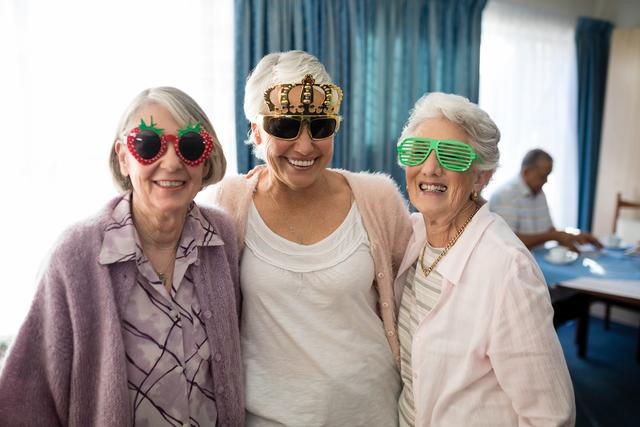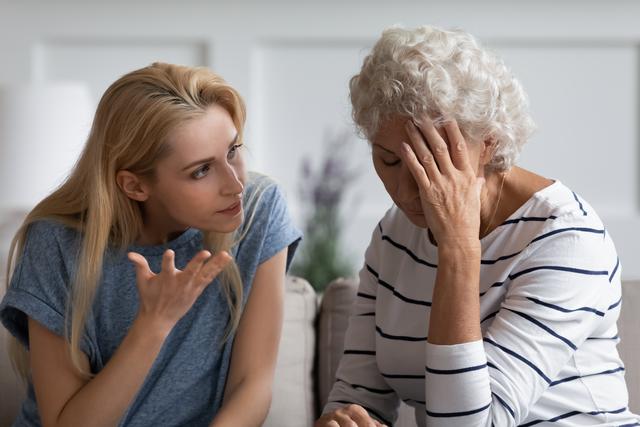Assisted Living
Caring for the Caregiver: How to Cope When Moving a Loved One
Assisted Living
Caring for the Caregiver: How to Cope When Moving a Loved One
If you’ve recently moved a loved one into assisted living, you’re probably experiencing a mix of emotions—relief, exhaustion, and sadness. I’ve often heard people say they feel guilty, but I caution the use of that word, which means having committed a specific offense. You’ve most likely done nothing wrong. You just had to make a difficult decision, so feeling bad about the situation is natural. After all, you’ve spent so much time caring for them, and now someone else is stepping in. It’s a huge transition, not just for them but for you, too.
First, acknowledge something important: You did not “abandon” your loved one. You made a thoughtful, loving decision to ensure they receive the care they need. But even knowing that logically doesn’t always quiet the emotional storm. So, let’s talk about navigating those feelings and taking care of yourself in the process.
Understanding the feelings
Guilt often comes from unrealistic expectations we place on ourselves. You might feel like you could have done more, should have waited longer, or should have been able to manage it all on your own. But here’s the truth—being a caregiver is one of the most challenging roles, and no one can do it alone forever. Needing help is not failure; it’s wisdom.
Instead of seeing this move as a loss, try reframing it as an expansion of care. Your loved one has a trained professional team ensuring their health, safety, and social well-being. And you? You get to transition from a full-time caregiver to a role of love and connection.
Managing Anxiety
Even when you know you made the right decision, the “what-ifs” can be overwhelming. Are they adjusting well? Do they feel abandoned? Are the caregivers treating them with kindness?
Here are some practical ways to manage that anxiety:
- Visit and Observe – Schedule visits to see how they’re doing, and take note of their mood, surroundings, and how staff interact with them. Also, drop in unannounced. Often, seeing them in good hands eases worry.
- Stay Connected – Call, video chat, or send small gifts or letters to remind them you’re thinking of them.
- Trust the Process – Adjustment takes time. The first few weeks may be tough, but most residents eventually find comfort in routine and community.
- Talk to the Staff – Build relationships with caregivers and nurses. Knowing the people looking after your loved one can bring peace of mind.
- Seek Support – Talk to other family members, join a support group, or seek professional counseling. You’re not alone in this.
Taking Care of Yourself
It’s easy to be so focused on your loved one’s well-being that you neglect your own. But you deserve care, too.
- Acknowledge Your Feelings—Permit yourself to grieve, to feel relief, and to miss them. It’s all valid.
- Prioritize Your Health – Get enough sleep, eat well, and find ways to move your body. Stress takes a toll, and your health matters.
- Reclaim Your Time—You’ve spent so much energy caregiving. What do you need now? Maybe reconnecting with friends, diving back into hobbies, or simply resting.
- Be Kind to Yourself – You’ve done something incredibly loving. Remind yourself of that often.
- Talk to a Senior Living Counselor612-787-7533
The Gift of Your Presence
One of the biggest fears people have when moving a loved one into assisted living is that their relationship will change for the worse. But this shift often allows for a different, sometimes even more profound, connection. When you’re not exhausted from caregiving duties, you can focus on just being with them—sharing memories, laughing together, and being their emotional anchor.
Your role hasn’t ended. It’s just changed.
So, take a deep breath if you’re feeling anxious or unsure. You’ve made a choice rooted in love and care, which is something to be proud of.
FAQ
Why assisted living?
Assisted living communities offer a lot of positive things for seniors. First, the residents have someone looking out for their well-being and safety. Social activities and exercise programs are tailored for seniors of all physical abilities. These features help slow cognitive decline and improve overall physical and mental health.
What is assisted living?
Assisted living is when a caregiver provides help with the "Activities of Daily Living"(ADL's) or personal care. Some examples of assistance are meals, eating, dressing, personal hygiene, toileting, bathing or showering, transfers to and from bed or chair, medication management, housekeeping, maintaining personal safety. A caregiver provides these services in a home, apartment-style home, or residential facility. The emphasis in assisted living is encouraging the resident to maintain independence.
What is caregiver burnout?
A state of physical, emotional and mental exhaustion.
How can a caregiver avoid burnout?
Some ways to avoid caregiver burnout are ask others for help, take regular breaks, pay attention to your feelings and needs and take care of your health.
What can happen to a caregiver if they don’t take breaks?
Caregivers often are so busy caring for others that they tend to neglect themselves which can lead to caregiver burnout.



